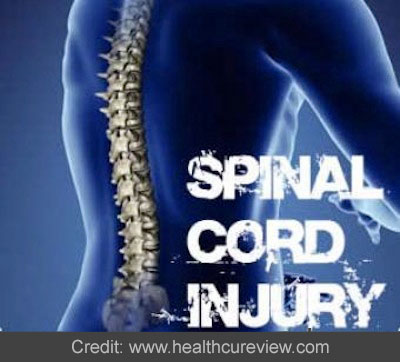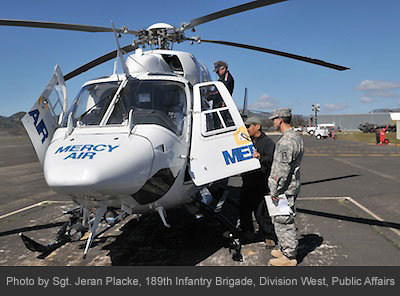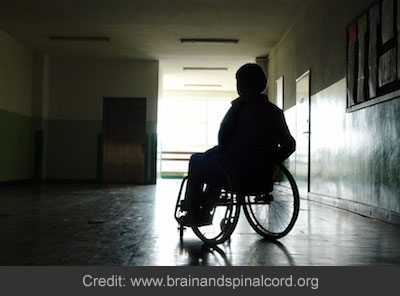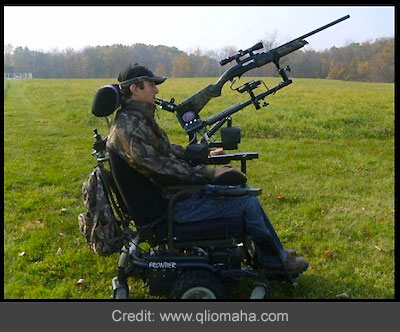Spinal injuries strike a special cord with me — no pun at all. Throughout my career, I have seen so many horrible spinal injuries resulting in paralysis and death. They ranged from falls to vehicle accidents to many gunshot wounds. How can we apply or translate this into what we hunters do? The answer is very, very simple.
 We drive to our hunting locations, we use ATVs at our camps, we use elevated hunting platforms, we travel uneven terrain, and, of course, we use high-powered firearms, all of which should be used with caution at all times. I do not think I will be telling you anything new. I am certain we all know someone who has been injured while hunting, and while I hope we all use the common safety standards taught to us, accidents can still happen.
We drive to our hunting locations, we use ATVs at our camps, we use elevated hunting platforms, we travel uneven terrain, and, of course, we use high-powered firearms, all of which should be used with caution at all times. I do not think I will be telling you anything new. I am certain we all know someone who has been injured while hunting, and while I hope we all use the common safety standards taught to us, accidents can still happen.
My goal here is to inform you on what to do if you find yourself or others with a possible spinal injury. This article will be longer and in a different tone because of the great importance I think it should have. There are countless accident scenarios in which we could find ourselves while hunting. This will be very basic but good information.
I have a very good friend who is an avid outdoorsman, hunter, and fisherman. This guy lives and breathes outdoor life. He is also a very skilled and gifted physician. He has an M.D. in medicine and a Ph.D in hunting and fishing respectively.
A few years back, he left for an average everyday hog hunting trip as he does whenever he can escape the office or hospital rounds. He arrived at his hunting camp, got settled in, checked gear, checked weapons, the whole bit as we all do. He headed out alone in the morning before sunrise, and settled in his tree stand 20 yards from a corn feeder. As he was waiting, a big herd of hogs came in. As normal, he shot as many as he could because they were damaging his deer plots. He dropped two or three and possibly a few others that ran off. He sat atop his stand admiring the damage when he decided to get down.
 Now, this man, who has been up and down tree stands his entire life and never had an accident or fall, would soon realize that ignoring a simple safety precaution would change his life forever. He forgot to buckle his safety harness and fell about 15 feet while exiting the stand.
Now, this man, who has been up and down tree stands his entire life and never had an accident or fall, would soon realize that ignoring a simple safety precaution would change his life forever. He forgot to buckle his safety harness and fell about 15 feet while exiting the stand.
When he landed, he had landed for the most part on his feet, but his knees buckled, and his rear slammed the ground violently. As he laid there on the ground in extreme pain, the M.D. inside him started screaming about the medical complications, and the Ph.D was yelling at him about complacency. Luckily, he did have his phone with GPS and called for help.
The rescue team got to him in just over an hour, and he was flown to a local hospital. He had a fractured pelvis and worse, a shattered thoracic vertebra. Not just fractured, shattered in several pieces. The x-ray looked as if someone stuck a mini stick of dynamite inside his back bone and detonated it. It was all over the place.
The orthopedic and spine surgeons did an excellent job and fixed most of it. He spent a very long time in the hospital and rehab facility from his injuries. He is not paralyzed, and he is lucky to have survived; however, he lives every day with severe back pain that limits his working and outdoor activities. He no longer has the drive for the outdoors like he once did. When he does go on a hunt, he is no longer excited, and it almost looks like he’s doing it out of habit, rather than having fun.
The point being, no matter who you are, educated or not, experienced or not, bad things can and will happen. Try to limit the bad stuff the best you can.
 According to two studies done at the same time (two different level-one trauma centers in the same state), falls accounted for the majority of hunting injuries. More importantly, falls from tree stands that led to severe injuries/paralysis accounted for 92% of that majority. Gunshot wounds were around 30%, and alcohol-related injuries were less than 3%. What this shows is that hunters are not using the provided safety equipment correctly, if at all, when it comes to elevated hunting platforms. It further shows that if you fall from a tree stand, more than likely it will be a life-changing event.
According to two studies done at the same time (two different level-one trauma centers in the same state), falls accounted for the majority of hunting injuries. More importantly, falls from tree stands that led to severe injuries/paralysis accounted for 92% of that majority. Gunshot wounds were around 30%, and alcohol-related injuries were less than 3%. What this shows is that hunters are not using the provided safety equipment correctly, if at all, when it comes to elevated hunting platforms. It further shows that if you fall from a tree stand, more than likely it will be a life-changing event.
We always make sure our weapons are checked, rechecked, and on safe before cleaning, moving, or storing them. The vast majority of us wear seat belts in cars and helmets while on ATVs. We live in a safety-conscious hunting world, but many choose to ignore the most simple and most important things like safety harnesses. If you use the safety equipment as suggested by the manufacturer, the only way you can fall out of the tree is if someone comes along and chops the tree down while you are in it! Okay. Okay. That is my soap box, and I am stepping off of it now.
Please remember, falling from three times your height can be fatal. Keep that in mind when you are climbing. If you find yourself lying on the ground from a fall at any height, whether you lose consciousness or not, please, please do not jump up and check yourself out after you realize you are laying on the ground! If you have pain in your neck or back, do not stand up and walk it off, and absolutely do not try to stretch the pain away. Sometimes pain will arrive shortly after you figure out what just happened. Do a quick reboot in your mind and check all your body’s hardware and software. Think about what hurts the worst and prioritize appropriately. If you are having moderate to severe pain in your neck or back, try to move as little as possible while doing a mental check. See if you can move your feet. Check to see if your arms are working. Remember to do everything very slowly to avoid causing yourself more pain and injury.
If you have severe pain in your neck or back, the only movement you should be making is the slow process of calling for help, using your radio, cell phone, or emergency beacon. If you don’t have any of these, you will be forced to evacuate yourself from the situation. You will have to do whatever it takes to get help.
In any case, only move what body parts you have to, and try not to cause more injury. If you find yourself in the worst-case scenario of not being able to move either you arms or legs (possible but highly unlikely), then I’m sorry, and I hope you told someone where you were at and what time to expect you home.
If your friend or hunting partner is injured from a fall, keep him calm and do the same things as you would do for yourself. After calling 911, see if he can wiggle his toes or feel you touching his feet or legs. Check to see if he can squeeze your fingers with his hands. If he is able to do these, it does NOT mean he can get up and walk it off. A person able to move or not move their extremities is extremely important information to give a 911 operator. Anytime anyone has moderate to severe neck or back pain, EMS professionals should transport him or her. Again, keep him calm, and try to keep him from moving around too much until EMS arrives.
 Initial treatments by EMS of spinal injuries are quite basic, and are the most important steps for a positive outcome. EMS will do a quick neurological assessment. You or your buddy will be placed in a cervical collar to prevent head movement in any direction. The patient will then be moved onto a long backboard to stabilize the spine from further movement and the team will transport you to the appropriate facility for treatment. You can get up and walk around only after a full set of x-rays are evaluated and a thorough doctor’s exam.
Initial treatments by EMS of spinal injuries are quite basic, and are the most important steps for a positive outcome. EMS will do a quick neurological assessment. You or your buddy will be placed in a cervical collar to prevent head movement in any direction. The patient will then be moved onto a long backboard to stabilize the spine from further movement and the team will transport you to the appropriate facility for treatment. You can get up and walk around only after a full set of x-rays are evaluated and a thorough doctor’s exam.
This all goes back to what I preach and preach about. Safety equipment was invented for a reason, most likely because someone else was already killed or severely injured. Be glad it wasn’t you. You owe it to your wife, kids, family, and friends to be as safe as possible at all times. Please don’t ignore safety warnings from manufacturers. I find it crazy that fellow hunters will go nuts if someone doesn’t put their weapons on safe when they’re not using them, but they will overlook or ignore their best friend or family member in an elevated platform with no safety measures in place. Mindset!! Mindset!! Mindset!! You don’t want to hunt from a wheelchair for the rest of your life.
Prepared or unprepared? Trained or untrained? Which one are you?

